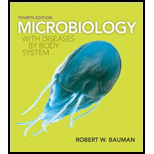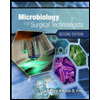
Microbiology with Diseases by Body System (4th Edition)
4th Edition
ISBN: 9780321918550
Author: Robert W. Bauman Ph.D.
Publisher: PEARSON
expand_more
expand_more
format_list_bulleted
Question
Chapter 10, Problem 6SA
Summary Introduction
To answer:
The preventive measures to inhibit the growth of the virulent strain. Pathogens (resistant strains) are a concern to the general health of a population.
Introduction:
The microbial cells become more resistant against the antimicrobials. It forms enzyme which make the drug to act slowly or prevent the drug entry. The drug is modified (target), so that the drug is unable to bind efficiently. The drug
Expert Solution & Answer
Want to see the full answer?
Check out a sample textbook solution
Students have asked these similar questions
please draw in what the steps are given.
Thank you!
please draw in and fill out the empty slots from image below.
thank you!
There is a species of eagle, which lives in a tropical forest in Brazil. The alula pattern of its wings is determined by a single autosomal gene with four alleles that exhibit an unknown hierarchy of dominance. Genetic testing shows that individuals 1-1, 11-4, 11-7, III-1, and III-4 are each homozygous.
How many possible genotypes among checkered eagles in the population?
Chapter 10 Solutions
Microbiology with Diseases by Body System (4th Edition)
Ch. 10 - Prob. 1TMWCh. 10 - Some antimicrobial drugs are harmful to humans....Ch. 10 - Antibiotic Overkill A young woman was taking...Ch. 10 - Prob. 3TMWCh. 10 - Why is it incorrect to say that an individual...Ch. 10 - Prob. 1EDCSCh. 10 - Prob. 2CCSCh. 10 - Prob. 1MCCh. 10 - In a Kirby-Bauer susceptibility test, the presence...Ch. 10 - Prob. 3MC
Ch. 10 - Prob. 4MCCh. 10 - Cross resistance is _____. a. the deactivation of...Ch. 10 - Prob. 6MCCh. 10 - Prob. 7MCCh. 10 - Prob. 8MCCh. 10 - Prob. 9MCCh. 10 - Prob. 10MCCh. 10 - Label each figure below to indicate the class of...Ch. 10 - What specific test for antimicrobial efficacy is...Ch. 10 - What characteristics would an ideal...Ch. 10 - Prob. 2SACh. 10 - Why is the fact that drug Z destroys the NAM...Ch. 10 - Given that both human cells and pathogens...Ch. 10 - Prob. 5SACh. 10 - Prob. 6SACh. 10 - Prob. 7SACh. 10 - Prob. 8SACh. 10 - Compare and contrast the actions of polyenes,...Ch. 10 - Prob. 10SACh. 10 - Prob. 1CTCh. 10 - How does Penicillium escape the effects of the...Ch. 10 - How might a colony of Bacillus licheniformis...Ch. 10 - Fewer than 1 % of known antibiotics have any...Ch. 10 - In an issue of News of the Lepidopterists Society,...Ch. 10 - Even though aminoglycosides such as gentamicin can...Ch. 10 - Prob. 7CTCh. 10 - Prob. 8CTCh. 10 - Why might amphotericin B affect the kidneys more...Ch. 10 - Antiparasitic drugs in the benzimidazole family...Ch. 10 - Prob. 11CTCh. 10 - Scientists have cultured bacteria isolated from...Ch. 10 - Prob. 13CTCh. 10 - Prob. 14CTCh. 10 - Enterococcus faecium is frequently resistant to...Ch. 10 - Prob. 1CM
Knowledge Booster
Learn more about
Need a deep-dive on the concept behind this application? Look no further. Learn more about this topic, biology and related others by exploring similar questions and additional content below.Similar questions
- students in a science class investiged the conditions under which corn seeds would germinate most successfully. BAsed on the results which of these factors appears most important for successful corn seed germination.arrow_forwardI want to write the given physician orders in the kardex formarrow_forwardAmino Acid Coclow TABle 3' Gly Phe Leu (G) (F) (L) 3- Val (V) Arg (R) Ser (S) Ala (A) Lys (K) CAG G Glu Asp (E) (D) Ser (S) CCCAGUCAGUCAGUCAG 0204 C U A G C Asn (N) G 4 A AGU C GU (5) AC C UGA A G5 C CUGACUGACUGACUGAC Thr (T) Met (M) lle £€ (1) U 4 G Tyr Σε (Y) U Cys (C) C A G Trp (W) 3' U C A Leu בוט His Pro (P) ££ (H) Gin (Q) Arg 흐름 (R) (L) Start Stop 8. Transcription and Translation Practice: (Video 10-1 and 10-2) A. Below is the sense strand of a DNA gene. Using the sense strand, create the antisense DNA strand and label the 5' and 3' ends. B. Use the antisense strand that you create in part A as a template to create the mRNA transcript of the gene and label the 5' and 3' ends. C. Translate the mRNA you produced in part B into the polypeptide sequence making sure to follow all the rules of translation. 5'-AGCATGACTAATAGTTGTTGAGCTGTC-3' (sense strand) 4arrow_forward
- What is the structure and function of Eukaryotic cells, including their organelles? How are Eukaryotic cells different than Prokaryotic cells, in terms of evolution which form of the cell might have came first? How do Eukaryotic cells become malignant (cancerous)?arrow_forwardWhat are the roles of DNA and proteins inside of the cell? What are the building blocks or molecular components of the DNA and proteins? How are proteins produced within the cell? What connection is there between DNA, proteins, and the cell cycle? What is the relationship between DNA, proteins, and Cancer?arrow_forwardWhy cells go through various types of cell division and how eukaryotic cells control cell growth through the cell cycle control system?arrow_forward
arrow_back_ios
SEE MORE QUESTIONS
arrow_forward_ios
Recommended textbooks for you
 Human Heredity: Principles and Issues (MindTap Co...BiologyISBN:9781305251052Author:Michael CummingsPublisher:Cengage Learning
Human Heredity: Principles and Issues (MindTap Co...BiologyISBN:9781305251052Author:Michael CummingsPublisher:Cengage Learning Microbiology for Surgical Technologists (MindTap ...BiologyISBN:9781111306663Author:Margaret Rodriguez, Paul PricePublisher:Cengage LearningHealth Safety And Nutrition F/Young ChildHealth & NutritionISBN:9781305144767Author:MAROTZPublisher:Cengage
Microbiology for Surgical Technologists (MindTap ...BiologyISBN:9781111306663Author:Margaret Rodriguez, Paul PricePublisher:Cengage LearningHealth Safety And Nutrition F/Young ChildHealth & NutritionISBN:9781305144767Author:MAROTZPublisher:Cengage




Human Heredity: Principles and Issues (MindTap Co...
Biology
ISBN:9781305251052
Author:Michael Cummings
Publisher:Cengage Learning

Microbiology for Surgical Technologists (MindTap ...
Biology
ISBN:9781111306663
Author:Margaret Rodriguez, Paul Price
Publisher:Cengage Learning

Health Safety And Nutrition F/Young Child
Health & Nutrition
ISBN:9781305144767
Author:MAROTZ
Publisher:Cengage
Infection Prevention and Control; Author: thecityoftoronto;https://www.youtube.com/watch?v=jx9sRYmBW3Q;License: Standard Youtube License